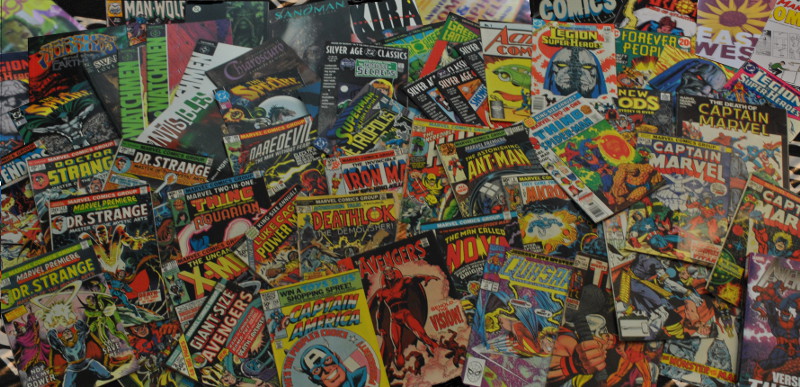One the most interesting things about the recent reboot the Big Two have just completed is the reestablishment of their premiere magicians in new, ongoing monthly series. More interesting is how the ad copy reads when the books are solicited in Previews. The description of each rebooted title included a common theme, expressed in almost the exact same words – the idea that the use of magic comes with a cost.
The quote that Marvel offers in their online description of the new Doctor Strange series
Similar phrasing was used in the solicitation for the New 52 reboot of Constantine the Hellblazer and that sentiment has been at least spoken of in the new book. Below is a single panel from issue #4, in which a drunken Constantine, haunted by both ghosts of his memory and real ghosts from his past, reflects on a time as a young man where he had a special relationship with a young girl who he had pulled into his magical lifestyle.
The interesting question to consider is why should the relaunches of both of these titles go out of their way to emphasize that magic has a cost? The answer lies in the observation that magic as a storytelling device is a disaster waiting to happen. All too often, the use of magic, unless used sparingly, becomes an unworkable deus ex machina. Since neither of these series can ‘use magic sparingly’, another mechanism must be sought in the form of a ‘cost’ or ‘price’ that limits magic use and codifies its rules.
One need only look at the turbulent publication history of these two characters to see the pattern that indicates that portraying them as unfettered users of magic causes problems and that they work better as characters the less that they actually appear.
Consider first the twisted publication history of Stephen Strange. In the roughly 50 years since his introduction in Strange Tales as a main character, no less than seven separate titles have been devoted to him as the lead (Strange Tales (1951), Doctor Strange (1968), Marvel Premiere (1972), Doctor Strange (1974), Strange Tales (1987), Doctor Strange: Sorcerer Supreme (1988), Doctor Strange (1999)). In each of these short-lived runs, he’s been redesigned and rebooted. He’s been portrayed variously as a reserved and aloof conjurer with the self-control of a Tibetan monk, a masked-crusader complete with super-hero poses and accompanying melodrama, an emotionally conflicted soul with a gnawing darkness at its root, and an aimless womanizer with insecurities a mile long. His most memorable stories have more to do with him as a bystander, witnessing the grandeur of the universe (e.g. Eternity & the Living Tribunal from Strange Tales (1951), the Sise-Neg story from Marvel Premiere, or the psychedelic brush with Death in the Doctor Strange (1973)) than they do with him as the lead.
The publication history of John Constantine has done better, at least in terms of the number of books. His tally is only three (Hellblazer (1988), Constantine (2013), and Constantine: The Hellblazer (2015)), although he’s actually on pace to have as many restarts when adjusting for the fact that he’s only been around since 1985. In addition, the recent television series Constantine, failed to find an audience and was cancelled after 13 episodes.
What makes magic appealing in small doses but unappealing as the main course centers on what magic actually represents. While there is no exact, universal characterization, magic, as used in literature, tends to embody the certain vaguely facets in the human existence:
- Undefined faculties of the human being (e.g. insight and intuition)
- Non-rational mode of human existence (e.g. feeling and emotions)
- Wish fulfillment
- Mysticism and the desire for spiritual connection with something bigger
The much larger success of John Constantine as a magician compared with Stephen Strange is attributable to the fact that the Vertigo imprint, as a whole, tends to emphasize emotions and feelings over logic and reason. But emotion and feelings can only take a story so far, there still needs to be a consistent and logical progression of events precisely because the world in which we live is subjected to those very constraints. We may indulge in a fantasy about wish fulfillment but we must still eat. We may have insight into a particular situation but we still express it using logic. We might explore our spirituality but we still need to go to work, pay the bills, and all the other things living in a material world with well-defined rules forces us into.
So this time around, the creative teams are trying to address these issues by placing limitations on the magic. In effect, they are trying to turn magic use into a different type of science, complete with a new set of rules that are consistent even if they are initially unknown to the reader. I suspect the creative teams and the powers-that-be at the big two have paid attention to and have been influenced by the success of the anime and manga entitled Full Metal Alchemist (FMA). FMA uses a rule-based magic as a vehicle to explore questions about war, love, and ethics in a way that has engaged audiences. The magic is merely the vehicle it uses as a means to ask deep and philosophical questions. Whether these two reboots can succeed remains to be seen.


